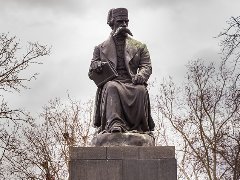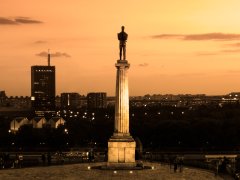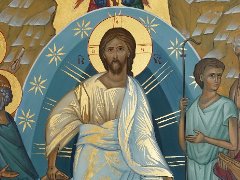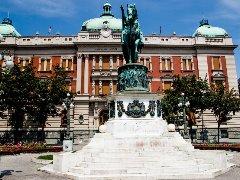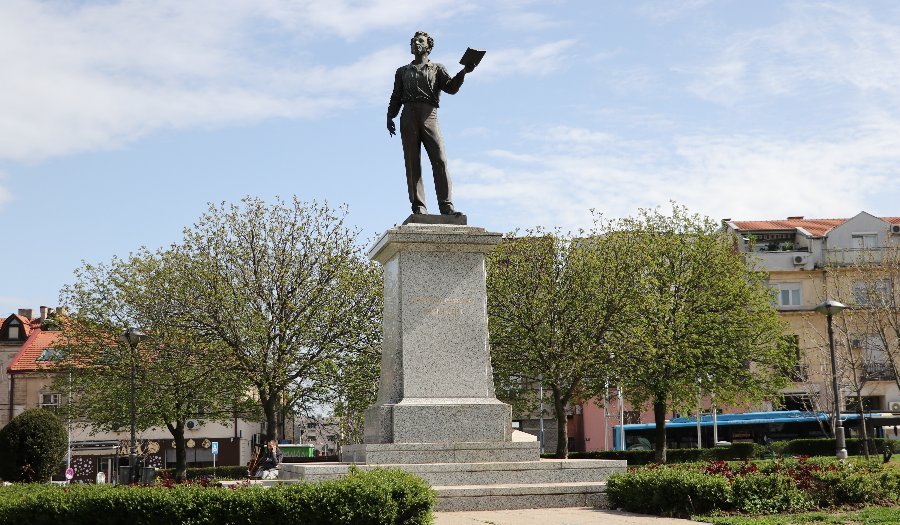
Alexander Sergeyevich Pushkin was born on 6th June 1799 in Moscow. The aristocratic but poor family he comes from made an effort to create an environment for him where literature is primary. Under the influence of writers from France, whose works were regularly read to him, and his grandmother, who was like a treasury of poems from Russia, he published his first poem when he was only 15 years old, and at the same time began the creation of his first work, Ruslan and Ludmila, which was first published in 1920.
The greatest Russian writer and poet of romanticism, the pioneer of modern Russian literature, the initiator of a new trend among book covers. Ahead of his time in both creativity and lifestyle. From appearance and clothing to representing attitudes that were unimaginable at the time. This and much more was Pushkin, whose life and works are still a popular topic today.
After finishing school, he got a job at the Ministry of Internal Affairs in St. Petersburg. He loved freedom in every sense, and because of sarcasm and inappropriate verses addressed to the Tsar, he was exiled to southern Russia for six years. Immediately after the transport, he thought about ending his life. Soon he fell ill, and from that period of his life he produced the works The Prisoner of the Caucasus, The Robber Brothers and The Fountain of Bakhchisaray.
Again, due to the same behavior and expression, he was deported to Odessa for a year. There he entered into an emotional relationship with a married woman. He had no intention of living by the standards of the time there either and moves to his mother's estate against his will. A rural idyll provides inspiration for what is probably the most widely read novel - Eugene Onegin. The inspiration came precisely from the married Anna Kern, for who he wrote the famous sentence "How is someone allowed to be so beautiful?".
Return to St. Petersburg, meeting and marrying Natalya Goncharova took place in 1830. Beautiful but far from Pushkin's heart. She was a spendthrift and idle woman, uneducated and uninterested in literature, but she gave him four children. Just seven years later, a duel took place in which Pushkin lost his life.
Frenchman Georges D'Anthès openly showed affection for his wife while publicly mocking the artist. Outraged, he scheduled a duel for 8th February. D'Anthès fired first and hit Pushkin in the stomach. Badly wounded, he managed to shoot back, in the chest. The French emigrant was only wounded, while Alexander Sergeyevich Pushkin died two days later, on 10th February 1837, in great agony. As he had liberal views throughout his life, the government did not allow ceremonies and an official send-off and he was buried in secret.
The books Pushkin will be forever known for and one of the most read authors are Ruslan and Ludmila, Eugene Onegin, Boris Godunov, Count Nulin, The Captain's Daughter, The Tale of the Fisherman and the Fish, The Queen of Spades, The Gypsies, Tsar Saltan, The Tales of Belkin, The Prisoner of the Caucasus, Poltava, The Bronze Horseman, Ode to Liberty.
Did you know that there is a monument to Pushkin in Belgrade? It is located right in the Cirilo and Metodije Park (Cyril and Methodius Park), better known as part of the city called Vukov spomenik (Monument to Vuk). When you get the chance, take a walk, accompanied by a Pushkin book, of course.
